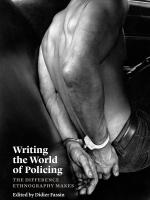Ethnography is the key to understanding policing and police violence
Policing has become an increasing area of public debate and critique across the world. Not least is there a growing concern regarding the violent and excessive law and order enforcement practices that police actors use in poor neighborhoods and toward racial and ethnic minorities. While recent police killings of young men of color in the US and the UK have received high international attention and led to popular protests, poor citizens in the Global South experience police violence almost on a daily basis. These matters raise important questions about the role of police and policing as one of the most problematic, yet omnipresent institutions in contemporary society. A new book, containing a contribution by DIIS Senior Researcher Helene Maria Kyed, addresses these issues by exploring the question: How can we better understand policing, and what methodologies and ways of thinking can aid this endeavor?
The new book Writing the World of Policing. The Difference Ethnography Makes, edited by Didier Fassin (Chicago University Press), brings together a rich collection of ethnographic studies of policing in disadvantaged neighborhoods across five continents that spans the Global North and the Global South (United States, Portugal, France, Turkey, South Africa, Mozambique, India, Taiwan, Thailand, Bolivia, and Chile). These in-depth, longitudinal studies, based on participant observation and inductive thinking, illuminates the tensions, complexities and varied meanings of policing, and law and order enforcement in society, which are not captured by statistics and questionnaires. The book’s editor, Fassin, argues that ethnography makes a difference to policing studies by giving access to the ordinary, everyday facts related to policing practices, including wrongdoing and deviances from the law. It also opens up for deeper understandings of why policing actors operate as they do in practice, based on these actors own justifications and reasoning. While ethnography entails that pre-conceived ideas and normative assumptions are set aside, and substituted with an eye for the hidden and unexpected, ethnographies of policing do not preclude critique, for instance of police brutality. Rather, ethnography allows for an informed critique, because the close-up observations of and engagements with policing actors provides in-depth understandings of why and under what circumstances such police brutality occurs.
Helene Maria Kyed’s contribution to the book explores the meanings of excessive and routinized police violence in a disadvantaged neighborhood of Maputo, Mozambique. During one and a half years, she observed the everyday operations of a civilian policing group, consisting of young men, who effectively had substituted the state police in dealing with crime and disorder. The chapter’s findings challenge the notion that the state (police) holds a monopoly on the legitimate use of force, which is a reality across many countries especially in the Global South. Apart from making this general point, Kyed elicits the various meanings of police violence, which are related not only to ideas about the police job, but also justified by the policing actors as responding to popular notions of justice and order. Neighborhood residents even sometimes demand police violence as a means to recover stolen goods, enforce compensation and discipline misbehaving neighborhood residents. These insights are enabled by the ethnographic approach, which provides empirical richness and nuances that helps to contextualize police violence. While Kyed does not condone the excessive use of force by the civilian policing actors, she uses the ethnographic insights to elicit the deeper enabling conditions for police violence in order to provide a critique of such violence at a structural rather than a personal level. She argues that police violence in Mozambique is the result of a long history of incomplete and contested state formation, which is both reflective of a state that has failed to serve its citizens and that has operated through violent means. Although democratization in Mozambique since 1992 has brought a range of citizen rights, in reality it has not improved the living conditions of the urban poor, who do not feel that the state protects and provides justice to them. This has given way to a surge in popular justice and civilian forms of policing, who act in violent ways as a means to overcome disorder and contested authority.
This was said about the book by prominent police scholars
“Writing about the world of policing makes a difference, and Fassin and his colleagues show how in this welcome volume. This collection of superb original papers, organized around themes like ‘position’, ‘observation’, and ‘description’, is prefaced by Fassin’s masterful reflections on ‘writing up’. A classic in the making, this is an assessment of an emergent field and a vision for future research.” Peter K. Manning, Northeastern University.
“Writing theWorld of Policingreinvents and returns ethnographic scholarship to the curiously neglected themes of the policing of poor neighborhoods, underprivilegedpopulations, and marginalized minorities. With narrative verve, this carefully edited volumeprovidesanempirically grounded account of just how the police everywhere shape and are shaped by the strikingly comparableworkthey do.” John Van Maanen, author of Tales of the Field.
“Fassin has asked some of the world’s best ethnographers of policing to reflect on the ethical, political and practical complexities of describing this unstable, if indispensable, heart of modern statecraft. The result is a unique collection of personal and reflexive essays, theoretically astute and global in scope, while deeply attentive to how the ethnographer co-produces the situation under analysis. This volume is not only timely and important at this historical juncture, it is also a contribution of lasting value that will inspire students and aspiring ethnographers and seasoned fieldworkers from all disciplines.” Thomas Blom Hansen, Stanford University.
DIIS Experts


